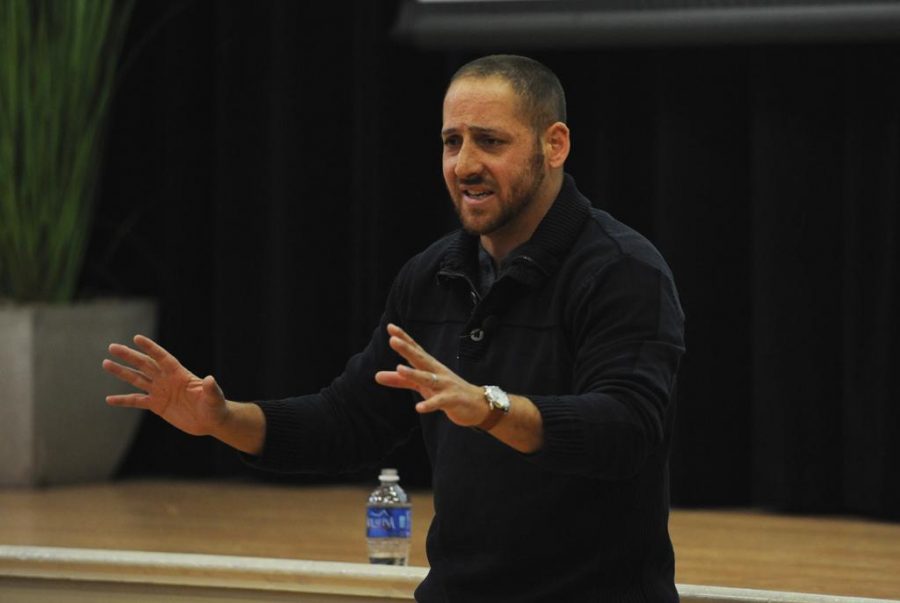Less than 1 percent of people who jump off the Golden Gate Bridge survive.
Kevin Hines is part of that 1 percent.
On Sunday at 3:30 p.m., about 220 members of the Pitt community gathered in the O’Hara Student Center Ballroom to hear Hines speak about his suicide attempt and ensuing mental health activism. In 2000, Hines jumped off the Golden Gate Bridge and missed severing his spinal cord by 1 centimeter, and now he tells his story to others to spread awareness about the importance of mental health.
As part of a series of presentations this year on mental health awareness, Pitt’s mental health task force invited Hines to speak at Pitt in partnership with the American Foundation for Suicide Prevention. Student Affairs and the AFSP invited Hines, AFSP Western Pennsylvania Chairperson Jennifer Sikora and Pitt Counseling Center Director Ed Michaels to Pitt as part of Hines’ tour around Pennsylvania.
“We are not here for the benefit of ourselves or for our personal gain,” Hines said about humanity. “We are here to give back to those around us.”
Hines jumped off of the Golden Gate Bridge two years after he was diagnosed with bipolar disorder. He stayed conscious after the impact with the channel of the San Francisco Bay and the Pacific Ocean and swam to the surface.
“As I fell, I said these words in my head: ‘What have I just done? I don’t want to die, God, please save me,” Hines said.
A woman driving on the bridge who saw Hines jump called her friend from the Coast Guard. While Hines waited in the water for the Coast Guard, he said a sea lion swam in circles underneath him and helped him stay afloat by bumping Hines up to the surface — something his friend called a “statistical anomaly.”
“I remember being in that water, and thinking that no one is going to know that I did not want to die,” Hines said. “No one’s going to know that I knew I made a mistake.”
For Sikora, part of mental health awareness is learning about the process of getting better.
“We wanted to bring an event to the campus that would promote healing,” Sikora said.
Hines shared his story in the 2006 documentary “The Bridge,” directed by Eric Steel, about people who took their lives on the Golden Gate Bridge. In 2013, Hines published a memoir of his story, titled “Cracked Not Broken: Surviving and Thriving After a Suicide Attempt.” Hines is currently working on a film documentary named “Suicide: The Ripple Effect,” which is about sharing stories of hope from all over the world. According to the New England Journal of Medicine, more than 90 percent of people who survive a suicide attempt do not die by suicide.
“I’m no fool,” Hines said. “Judging by the numbers in this room, we are here because a lot of us may have lost someone we love or cared for or just knew to suicide.”
Hines now speaks at various schools, conferences and organizations about the importance of speaking about mental health.
“They help people open up, tell their truth,” Hines said about his lectures. “They help people ask for a way to get help, treatment and steps for recovery.”
Speaking after Hines, Sikora shared her story of losing her sister to suicide in 2001. She spoke about risk factors, such as family histories of suicide, prolonged stress and suffering from chronic pain, as well as warning signs and preventive measures to take.
“I hope you walk away knowing what I did not know then,” Sikora said.
Sikora emphasized that “talk saves lives,” telling the people in attendance she has an anxiety disorder and that she talks about it to cope.
“Don’t be embarrassed about it if it affects you,” Sikora said. “I’m not ashamed. I hope none of you are ashamed if you have [a mental illness].”
Both Hines and Sikora said it is not only up to those suffering from mental illness to reach out. After sharing that another man who jumped off the Golden Gate Bridge wrote in his suicide note that he decided he wouldn’t take his own life if someone smiled at him, Hines told the people in attendance to turn to the person next to them and smile as a way to acknowledge how easy it is to support someone struggling with mental illness.
“You all have that ability to smile,” Hines said. “This man died for the lack of a turn of the cheek.”
Michaels spoke after Sikora about the availability of counseling services at Pitt, and said the counseling center is in the process of expanding mental health services, particularly by hiring an additional six counselors to work at the center.
Michaels said anyone who feels they can benefit from counseling center services is welcome to go to the center.
“We are there for you, to support your success as a student at Pitt,” Michaels said.
At the end of his lecture, Hines asked people to cherish every day and moment of their lives.
Civil engineering sophomore Mary Callum said she feels the lecture did spread awareness.
“If someone in the audience had suicidal thoughts before, I think hearing him speak was inspiring to show that you can get help and it will be OK,” Callum said. “You’ll be OK.”



